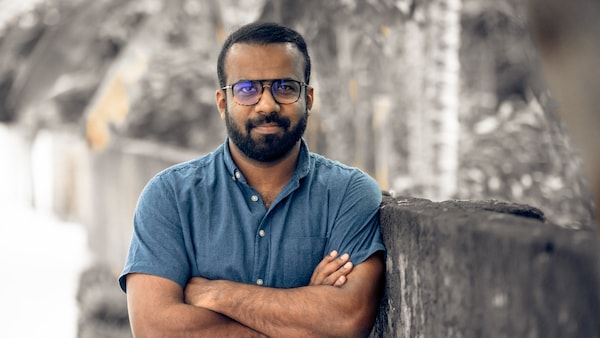Exclusive! Jakes Bejoy: For Kuruthi’s music, we have used Nordic folk elements and instruments
In an exclusive interview with OTTplay, the ace composer talks about working with Prithviraj Sukumaran, the lessons from working in different industries and the music for Mammootty’s and Dulquer’s upcoming films Puzhu, CBI 5 and Salute

Last Updated: 08.40 PM, Aug 13, 2021
If anybody needs a reminder of why Jakes Bejoy is one of the most sought-after composers in Malayalam today, just look at the list of projects he is part of. Suresh Gopi’s Pappan, Prithviraj Sukumaran’s Bhramam and Kaduva, Mammootty’s Puzhu and CBI 5 and Dulquer Salmaan’s Salute – all much-anticipated by the audiences. Most recently, Jakes once again spun his magic with the intense music in Kuruthi, which is currently streaming on Amazon Prime Video.
In an exclusive interview with OTTplay, Jakes talks to us about working with Prithviraj, the influences for Kuruthi’s music and lessons learnt from working in other film industries.
You have been working on a lot of projects with Prithviraj – from Ranam and Ayyappanum Koshiyum to Kuruthi and Andhadhun’s remake, Bhramam. As a music director, what is the scope of creative freedom you get in his projects?
When I am working with him, he gives me absolute freedom to handle that department. There are no restrictions whatsoever; he believes that I can understand the subtexts of the films properly and underline what the writer-director-actor trio expects through my music. So, he has that complete trust.
In the case of Kuruthi, because it had a religious context, we didn’t want to include Arabic instruments like rubab or anything like veena or tabla that hinted at Hindu elements. It’s a human problem and it’s set in a forest. So, we thought choosing the music genre is very important and I think it’s the first time in Malayalam, we have used Nordic folk elements. The entire film is based on Norwegian instruments such harpa lira, tagelharpa and shaman drums. All of these add to the film.
I have worked in a lot of thrillers but the challenge in this film was to create an ambience of being stuck in the forest, but feel terrorised due to the people around.
Mankoodil had a bit of Arabic influence because it was discussing Ibrahim’s personal issue. He is a staunch Muslim and wants to go to heaven. He wants to perish but his imam says it’s against the will of Allah. So, that portion was hinted as the voice of the world that he wishes to be in. But if you look at the treatment, though it’s Arabic, it’s also more lounge-y. The beats are more stylish. I didn’t want to create the usual vibe with these songs.
As you mentioned that you are a composer who understands the subtexts of the movies and it’s also evident from the music of Ayyappanum Koshiyum and Kuruthi, to name a few. How much do you enjoy the process of research for films to create the music?
Oh, I enjoy it a lot! All composers would agree that there is a director in all of us. What I look at is to present a new experience to the audience while also vividly conveying the filmmaker’s vision. It’s challenging, but I try to create a palette from the script. Then, I discuss the ideas with the director and once we come to an understanding about the vibe required, then it’s just about me doing the research that is required and having fun with it.
Say about two years ago, you probably had about 3-4 movies a year. But in the recent past, that number has skyrocketed. Do you now get as much time to dedicate to the research process?
I still do only one film at a time. All these projects that you see are the ones that I had committed two years ago but haven’t been completed due to the pandemic. However, I ensure that my team and I are working on just two projects at my studio at a time. Kuruthi took almost six months of our time. Bhramam is easier because we already have a template with Andhadhun and I don’t want to do too many things out of it. So, my next projects are films that are about to release within the next three months or were committed a long time ago.
You are also composing for films in Telugu, Tamil and even Bollywood such as Durgamati last year. Does it help keep things fresh for you?
When you do projects in other industries, there’s a perspective shift. They don’t think the same we do in Malayalam. There’s a huge learning and unlearning happening. For instance, I am doing a huge ‘mass’ film, Kaduva. I have worked with Geetha Arts in Telugu that produces the biggest commercial entertainers. It was an education to know how to make a commercially engaging subject into a mass film, and this has helped in Kaduva. The Hindi film industry is more corporate in the way it functions. That was also a learning experience. In Malayalam, you have more creative liberty.
For Ranam’s track, you have used synthwave and similarly Sushin Shyam too experiments with his music weaving Western influences into very rooted Malayalam stories. How much do those help in increasing the reach of the music as well as the movie?
Everybody wants to experience something new. Composers are now trying to connect with the audience on that level, while still being rooted. It’s an ever-evolving experiment, to come up with something fresh. I think that’s where a lot of listening and learning helps you explore different genres and bring those influences in. Right now, most of the movies have consistent music in terms of the template, texture and thematic ideas.
In the case of some of your movies such as Ranam, the music was a bigger success than the movie. Do you, however, feel disappointed when the movie doesn’t do well?
In the case of Ranam, be it me or (director) Nirmal (Sahadev), we were a bit disappointed initially but right now, I can proudly say, it’s my visiting card in Malayalam cinema because of the aesthetic and the kind of noir ideas we brought in. It’s a rarity that a song becomes a huge hit but the film doesn’t work. That does cause pain. In fact, that’s the case for all movies; whenever a movie releases in theatres, we all feel nervous about the response from the audience. I think once you lose that worry, you can leave this profession. Only a person who cares so deeply about their projects will have that creative fire.
You also have Mammootty’s Puzhu and CBI 5 and Dulquer Salmaan’s Salute coming up. What can you tell us about working on those projects?
I am currently working on Salute. Right now, it’s important that you finish movies because you never know which film is going to happen because of the pandemic. (Director) Rosshan (Andrrews) chettan is a pleasure to work with. He is a genius.
Puzhu has a fantastic script; it’s been a while since Mammukka has attempted something like that. I am excited to start working on it. The film will showcase his acting prowess. It will have him in a performance like Vidheyan more than the ‘mass’ Mammukka. CBI 5 is again a film that I am waiting for. When I begin work on it, there would be no other project, I will entirely focus on it. We aren’t going to change the theme a lot, there will only be some modifications to make it relevant to the times.

 Premium
Premium